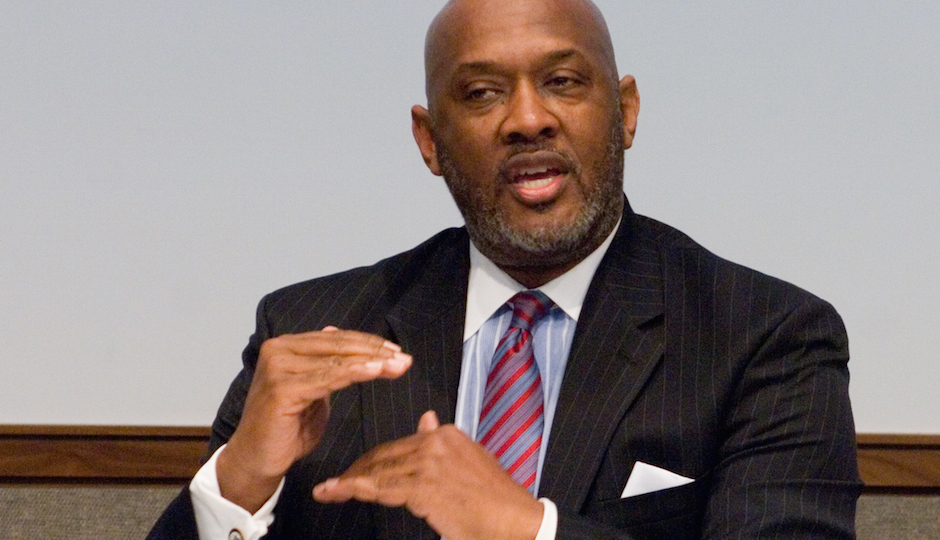Insider: Dwight Evans — Not Chaka Fattah — Is the Frontrunner in the Congressional Race
(Editor’s note: This is an opinion column from a Citified insider.)
[Update, Feb. 6] After publication of this op-ed, Philly Mag learned that the author’s firm donated $500 to Dwight Evans’ campaign in December. That information should have been disclosed in this article. Citified regrets the omission.
[Original] This time last week, the race to unseat U.S. Congressman Chaka Fattah was playing out with no major surprises. Or so it seemed.
Max Marin at Al Dia had just reported that longtime state Rep. Dwight Evans had $280,000 in the bank. That’s more money than any other challenger has raised in the campaign, but it isn’t exactly blow-you-away money. With $230,000, state Rep. Brian Sims was behind Evans in the money race within the race; Dan Muroff was next with $210,000, and Lower Merion Township Commissioner Brian Gordon rounded out the field with $18,210 (as of September). Fattah, meanwhile, has yet to reveal how much he’s got in the bank.
This was all to be expected: Pundits have long said it would be difficult to unseat Fattah, but that Evans was the best equipped to challenge him. But it’s still early in the campaign. The April 26th primary is a long way off and most voters aren’t fully engaged yet. At least, that’s what I thought.
Then word leaked out Monday that Public Policy Polling, a respected national firm, had conducted a survey of 790 likely primary voters in the 2nd Congressional District, asking them which candidate they liked best. The initial results should surprise just about everyone:
There’s a lot to unpack here. Where to begin?
First, some caveats: Details are sparse; for example, Public Policy Polling provided no information on the age, sex and income level of respondents. Apparently 25 percent of those polled were undecided. And, most importantly, this is not an independent poll. It was paid for by Evans. But absent any independent polls (which, given that there was only one independent poll in the 2015 mayoral campaign, I highly doubt we’ll see in this less-watched Congressional race), this is all we’ve got.
The numbers indicating the overall level of support for Evans are fascinating in and of themselves, but going inside the numbers is even more revealing. Compared to Fattah, Evans has an almost 2-to-1 margin of support among likely black primary voters and an almost a 3-to-1 margin of support among likely white primary voters, according to the poll. That’s huge. It was widely assumed that Fattah would carry black voters in the district, as he always has, and that to win Evans would have to chip away slightly at that number and get more than his share of white voters, mostly from parts of Montgomery County. But this? Evans is showing equally strong with black and white voters. That means that Evans is polling well in his Northwest base and also doing respectably outside of it in West Philly, North Philly and Center City.
The poll, which was conducted from Jan. 8 to 10, also surveyed favorability. Forty-nine percent of voters perceived Evans as favorable versus 19 percent who viewed him as unfavorable. The numbers were 39 percent favorable and 37 percent unfavorable for Fattah. Favorability numbers for the other three candidates were not released.
What does this all mean? It merits saying, again, that this is not an independent poll. This was commissioned and paid for by Evans. But that detail will likely be lost in the weeds. Unless another candidate comes out with their own poll to dispute it, this poll will serve as the definitive start in the race to shape the narrative around who the favorite is to win the 2nd. It was a smart move by Evans, because this is the first documented poll in the race and will be the benchmark against all future polls.
However, the purpose of a poll isn’t solely for the leading candidate to claim a position; the true purpose of a poll is to serve as a fundraising tool. People are risk-averse and understandably prefer the surer bet in campaigns. It is significantly easier to raise money when you are the perceived favorite, have a lead, and have evidence of huge structural support. In this city, scared money is what people mostly have. Hardly anyone gives to long shots. That’s just not how it’s done.
The campaign finance circle of life is: Raise money to fund a poll; use the poll to raise money; fund a poll again; raise more money; run ads; raise more money to pay for your street operation; and — voila! — you should have a winner. If Evans continues to raise money at this rate and the poll numbers continue to favor him, hold on — because we’re in for a wild ride in the 2nd.
Mustafa Rashed is the President & CEO of Bellevue Strategies, a government relations, advocacy and consulting firm. He is Chairman of Friends of Doug Oliver, PAC, and he was the campaign manager of Oliver’s recent mayoral run.
